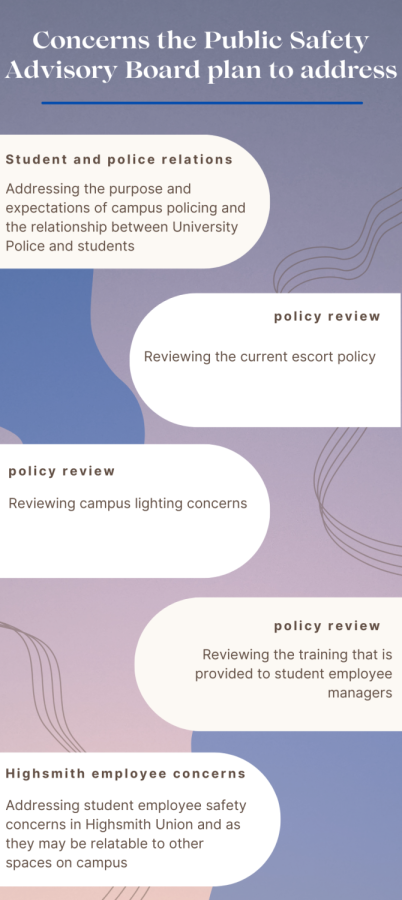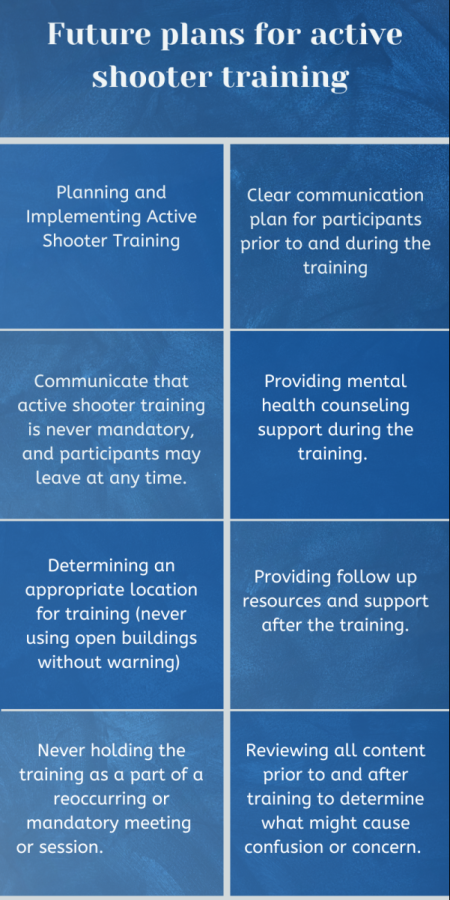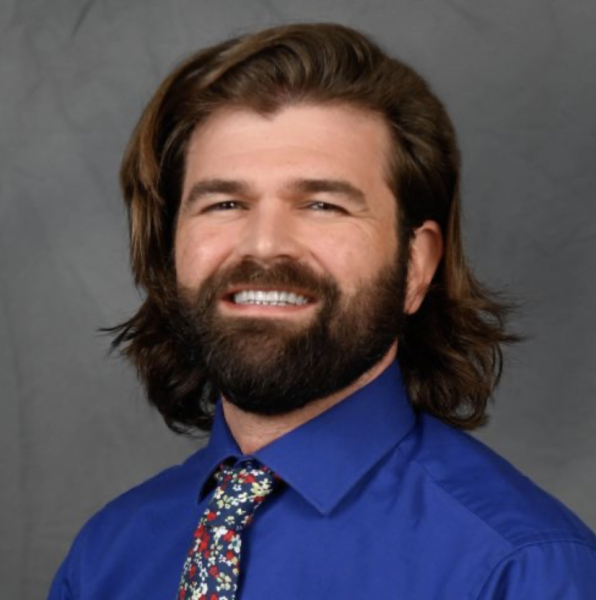Newly announced Public Safety Advisory Board met with hesitant optimism
Plans for future active shooter trainings according to Meghan Harte Weyant’s email to students.
UNC Asheville students remain unsatisfied with the resolution of the controversial active shooter training in Highsmith Student Union on Sept. 20.
“We have to have students still talking. Keep the energy, keep the momentum going so the administration is pushed to pursue these long-term solutions,” said Thomas Tillman, president of the Black Student Association.
Vice Chancellor of Student Affairs Meghan Harte Weyant emailed students on Oct. 7 with a brief of their investigation into the Highsmith student employee training incident. In the email, she outlined the school’s next steps, review determinations and announced the creation of the Public Safety Advisory Board.
“My hope is to establish a standing advisory group for campus-wide public safety concerns,” Weyant said.
Weyant did not specify if the group had any plans or goals to dismantle policies that privilege surveillance and policing on campus but said she expects and hopes discussions of such topics will arise in their meetings.
“This is really the intent behind the advisory board, to clarify our institutional values and determine how best to align our policies with those values,” she said. “Policies about surveillance, policing and emergency response must be intentionally designed in alignment with our institutional values.”
Tillman said the effectiveness of the student board depends on its implementation.
“As long as there’s good diverse representation on it, diversity of opinion, diversity of ideas, diversity of background and you can have different perspectives working together, I think it’s something that could be really effective if implemented in the right way,” Tillman said.
To keep student engagement in the program, Tillman suggested adding compensation for students who join the board.
“Pay them for their time first of all. They’re doing a service for the university, so compensation for being on the board is important,” Tillman said. “Students can’t be asked to volunteer to do that kind of work.”
On top of compensation, Tillman said having spaces for student expression and grievances proves important, especially with online spaces, as he mentioned the creation of several anonymous student pages, which some use to express their thoughts on the school and administration.
“As long as there’s voices being able to be heard on things like anon, it’s a devil’s sword, but as long as there’s outlets for students, then they should be heard,” he said.
Unca.anon2 is a popular Instagram page used by students as an anonymous public forum. Students share information, discuss campus problems, ask questions and talk about decisions or actions made by staff and faculty.
Besides reviewing the active shooter training program, Tillman suggests the board take a lead on student patrol by implementing more of a community policing approach and adding elements of restorative justice.
“I’ve heard a lot of stories of bad roommate situations and these RAs are not quick to establish a dialogue between students. If we could have a board dedicated to that, to building that dialogue to have conflict resolution and equitable outcomes, that would be really nice, too,” he said.
Tillman said he would like to see student patrol and restorative justice become branches of the Public Safety Advisory Board.
“I don’t want that committee to be something that just looks at this incident and it goes away. I would want it to be something that becomes a part of the institution. Part of student life,” he said.
A previous initiative by the anti-racist student organization during the fall 2020 semester attempted to implement a student-led Community Safety Program that tried to create a student escort system.
Although open to the idea of a student escort system, Tillman said the implementation requires oversight as it is a position that opens itself to potential abuse.
“I think what we should have on campus is a community that cares about each other and designates the roles out of that like an escort. We have a lot of remote lots so making sure they can walk back to their dorms safely,” he said. “That would be great and just the different ways that we can build an on-campus community that protects and cares about each other. You don’t need to know a person to help.”
Tillman said he has not had any experiences with campus police but has friends who had negative experiences.
“If we’re going to have police on campus and if they’re going to be armed like they are, I’d like to know who they are. I’d like them to show themselves to the community and try to establish relationships with students. Like personable ones,” he said.
Tillman said the only interactions he can recall with campus police was when he met the Assistant Chief of Police Danny Moss at orientation.
“The way he talks he sounds like he cares but, I don’t see him around that much or any of the 12 officers. I couldn’t name anyone other than Danny. We got a new head, so I’ll cut him a break,” he said. “Introduce yourself without the full force the power levels are off in the whole situation. You already have the badge, you don’t need the gun.”
Diamond Forde, an associate professor of English at UNCA, said the more the campus works together toward the well-being of all students, the better, especially for students who are part of racially marginalized groups.
“As a Black femme professor, in particular, I definitely mean BIPOC students in that statement, my students who most need spaces that dismantle the influence of the police state around us,” she said.
BIPOC stands for Black, indigenous, people of color and is a term meant to emphasize the experiences of Black and indigenous people and shows solidarity within communities of color.
For Forde, listening to what students have to say plays an important role in student safety.
“Part of how I hope we see ourselves as administrators, faculty, and staff serving the well-being of the student body, is by asking ourselves how often we listen,” she said. “How often do we incorporate the voices and ideas of the students in our decision-making process, and how often are we implementing our own experience alongside these ideas and not in spite of them.”
Although Forde finds the implementation of a student-centered safety group fascinating, she has concerns as a bystander in the decision to create the board.
“Who will participate in this board,” Forde said. “What checks and balances will be in place in the decision-making process, and how many of the goals of the board will focus on dismantling policies that privilege surveillance and policing on campus.”
Members for the board have not yet been chosen, but Weyant said she plans to work with the Student Government Association, Staff Council, Faculty Senate and a number of people who have volunteered to join the advisory board. The group will work to help advise her office on major public safety concerns.
“I believe we have the ability to make impactful change moving forward in regards to how we support students and our campus community,” she said.
Due to the board being in its planning phase, the Director of Health and Counseling Jay Cutspec and campus police are unable to speak about their department’s involvement in the project, but Weyant said she plans to include both departments.

In Weyant’s brief to students, she mentioned the lack of mental health professionals during the meeting and listed plans for their feature involvement in future active shooter training. Although Weyant did not specifically mention the health and counseling departments’ role in the group, she said they are an important department for representation.
“I am anticipating that both health and counseling and public safety will be represented on the board,” she said. “Once the board makes recommendations, I will work with student affairs staff and senior staff to enact policy and procedural change.”
The board’s first task is to reevaluate the active shooter training and then move on to additional concerns.
“The task force should review the need for simulations during training. In addition to reviewing the purpose and learning outcomes, the task force will make recommendations on the training content based on best practice. The Public Safety Advisory board will advise the department of public safety moving forward,” said Weyant in her email to students sent on Oct. 7.
As stated in Weyant’s email, the group will review the current escort policy, campus lighting concerns and training provided to student employee managers.
“There are a number of additional concerns that have been brought to my attention since my arrival,” she said.
The group will also address the purpose and expectations of campus policing and the relationship between university police and students.
“I am anticipating that both health and counseling and public safety will be represented on the board. Once the board makes recommendations, I will work with student affairs staff and senior staff to enact policy and procedural change,” she said.



















